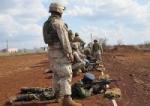I’ve been traveling a lot so have only now gotten around to reading “Dead End: Counterinsurgency Warfare as Military Malpractice,” Edward Luttwak’s article in the February issue of Harper’s. As usual with Luttwak, the article is thought-provoking and stylishly written. It’s also almost entirely wrong.
The blog of the Small Wars Journal has already posted two trenchant critiques of the article, by two of the leading counterinsurgency experts in the world: Dave Kilcullen, a former lieutenant colonel in the Australian army now working as an adviser to General David Petraeus in Baghdad, and Frank Hoffman, a retired Marine lieutenant colonel and a fellow at the Foreign Policy Research Institute in Philadelphia.
I won’t repeat most of what they have to say, except to note that Kilcullen scores a devastating hit when he observes that Luttwak is critiquing an early draft of FM 3-24, the Army/Marine Corps counterinsurgency field manual...






 . I think that one of the key problems with trying to work in material on "religion" into the new FM is the very different conceptualizations that are running around: "individual believer" (the North American "standard"), "social believer" (for want of a better term; the standard in most of the Muslim world), and academic.
. I think that one of the key problems with trying to work in material on "religion" into the new FM is the very different conceptualizations that are running around: "individual believer" (the North American "standard"), "social believer" (for want of a better term; the standard in most of the Muslim world), and academic. ! Still and all, there are many models for "modern", not just the liberal-democracy that we now hae in the West.
! Still and all, there are many models for "modern", not just the liberal-democracy that we now hae in the West. . I have, however, noted that most religions contain ways of "testing" and "challenging" any "received wisdom", and IMHO, this is one of the things I think we need to be looking at quite seriously in our current conflict.
. I have, however, noted that most religions contain ways of "testing" and "challenging" any "received wisdom", and IMHO, this is one of the things I think we need to be looking at quite seriously in our current conflict.



Bookmarks